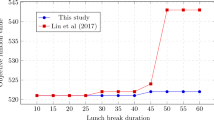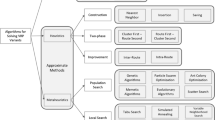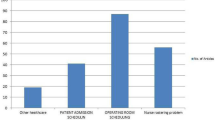Abstract
Railway crew scheduling deals with generating duties for train drivers to cover all train movements of a given timetable while taking into account a set of work regulations. The objective is to minimize the overall costs associated with a crew schedule, which includes workforce costs and hotel costs. A cost minimal schedule often contains duties that are unpopular to train drivers, and these unpopular duties are often unevenly distributed among crew depots. At the company that motivated our research, for example, train drivers dislike duties that start in the early morning hours. Currently, some crew depots operate large numbers of these unpopular duties, while others do not have any unpopular duties at all. The train drivers perceive this situation as unfair. They prefer schedules with fewer and more evenly distributed unpopular duties across crew depots. In this paper, we define and measure unpopularity and (un)fairness in a railway crew scheduling context. We integrate fairness conditions into a column generation-based solution algorithm and analyze the effect of increased fairness on cost. We also show how increased fairness affects the unpopularity of a schedule. Our method has been applied to test instances at a large European railway freight carrier. Compared to a standard approach that penalizes only the number of unpopular duties in a schedule, we were able to significantly improve schedule fairness with only marginal increases in schedule cost.










Similar content being viewed by others
References
Abbink, E., Fischetti, M., Kroon, L., Timmer, G., & Vromans, M. J. C. M. (2005). Reinventing crew scheduling at Netherlands railways. Interfaces, 35(5), 393–401.
Adams, J. S. (1965). Inequity in social exchange. Advances in Experimental Social Psychology, 2, 267–299.
Akerstedt, T. (1998). Is there an optimal sleep-wake pattern in shift work? Scandinavian Journal of Work, Environment & Health, 24(suppl 3), 18–29.
Akerstedt, T. (2003). Shift work and disturbed sleep/wakefulness. Occupational Medicine, 53(2), 89–94.
Bard, J. F., & Purnomo, H. W. (2005). Preference scheduling for nurses using column generation. European Journal of Operational Research, 164, 510–534.
Barnhart, C., Johnson, E. L., Nemhauser, G. L., Savelsbergh, M. W. P., & Vance, P. H. (1998). Branch-and-price: Column generation for solving huge integer programs. Operations Research, 46(3), 316–329.
Blöchliger, I. (2004). Modeling staff scheduling problems. A tutorial. European Journal of Operational Research, 158, 533–542.
Bolton, G. E., & Ockenfels, A. (2000). ERC: A theory of equity, reciprocity, and competition. The American Economic Review, 90(1), 166–193.
Borndörfer, R., Grötschel, M., & Löbel, A. (2001). Scheduling duties by adaptive column generation. Technical Report 01-02, Konrad-Zuse-Zentrum für Informationstechnik, Berlin, Germany
Caprara, A., Toth, P., Vigo, D., & Fischetti, M. (1998). Modeling and solving the crew rostering problem. Operations Research, 46(6), 820–830.
Caprara, A., Kroon, L., Monaci, M., Peeters, M., & Toth, P. (2007). Passenger railway optimization. In C. Barnhart & G. Laporte (Eds.), Handbooks in operations research and management science, Vol. 14 transportation, Chap. 3 (Vol. 14, pp. 129–187). Amsterdam: Elsevier B.V.
Cordeau, J. F., Toth, P., & Vigo, D. (1998). A survey of optimization models for train routing and scheduling. Transportation Science, 32(4), 380–404.
De Boer, E. M., Bakker, A. B., Syroit, J. E., & Schaufeli, W. B. (2002). Unfairness at work as a predictor of absenteeism. Journal of Organizational Behavior, 23, 181–197.
De Causmaecker, P., & Vanden Berghe, G. (2011). A categorisation of nurse rostering problems. Journal of Scheduling, 14(1), 3–16.
Desrosiers, J., & Lübbecke, M. E. (2005). A primer in column generation. In G. Desaulniers, J. Desrosiers, & M. M. Solomon (Eds.), Column generation, Chap. 1 (pp. 1–32). New York: Springer.
Dowling, D., Krishnamoorthy, M., Mackenzie, H., & Sier, D. (1997). Staff rostering at a large international airport. Annals of Operations Research, 72, 125–147.
Fehr, E., & Schmidt, K. M. (1999). A theory of fairness, competition, and cooperation. The Quarterly Journal of Economics, 114(3), 817–868.
Folkard, S., & Barton, J. (1993). Does the ‘forbidden zone’ for sleep onset influence morning shift sleep duration? Ergonomics, 36(1–3), 85–91.
Folkard, S., & Tucker, P. (2003). Shift work, safety and productivity. Occupational Medicine, 53(2), 95–101.
Gamache, M., Soumis, F., Marquis, G., & Desrosiers, J. (1999). A column generation approach for large-scale aircrew rostering problems. Operations Research, 47(2), 247–263.
Harrington, J. M. (2001). Health effects of shift work and extended hours of work. Occupational and Environmental Medicine, 58(1), 68–72.
Homans, G. C. (1961). Social behavior: Its elementary forms. San Diego: Harcourt Brace.
Jütte, S., Albers, M., Thonemann, U. W., & Haase, K. (2011). Optimizing railway crew scheduling at DB Schenker. Interfaces, 41(2), 109–122.
Kecklund, G., & Akerstedt, T. (1995). Effects of timing of shifts on sleepiness and sleep duration. Journal of Sleep Research, 4(suppl 2), 47–50.
Knauth, P. (1993). The design of shift systems. Ergonomics, 36(1–3), 15–28.
Kroon, L., & Fischetti, M. (2001). Crew scheduling for Netherlands railways “Destination: Customer”. In S. Voß & J. R. Daduna (Eds.), Computer-aided scheduling of public transport (Vol. 505, pp. 181–201)., Lecture notes in economics and mathematical systems Berlin: Springer.
Maenhout, B., & Vanhoucke, M. (2013). An integrated nurse staffing and scheduling analysis for longer-term nursing staff allocation problems. Omega, 41(2), 485–499.
Martin, S., Ouelhadj, D., Smet, P., Vanden Berghe, G., & Özcan, E. (2013). Cooperative search for fair nurse rosters. Expert Systems with Applications, 40(16), 6674–6683.
Mason, A. J., Ryan, D. M., & Panton, D. M. (1998). Integrated simulation, heuristic and optimisation approaches to staff scheduling. Operations Research, 46(2), 161–175.
Millar, H. H., & Kiragu, M. (1998). Cyclic and non-cyclic scheduling of 12 h shift nurses by network programming. European Journal of Operational Research, 104, 582–592.
Rosa, R. R., Härmä, M., Pulli, K., Mulder, M., & Näsman, O. (1996). Rescheduling a three shift system at a steel rolling mill: Effects of a one hour delay of shift starting times on sleep and alertness in younger and older workers. Occupational and Environmental Medicine, 53, 677–685.
Schaefer, A. J., Johnson, E. L., Kleywegt, A. J., & Nemhauser, G. L. (2005). Airline crew scheduling under uncertainty. Transportation Science, 39(3), 340–348.
Simons, T. L., & Roberson, Q. (2003). Why managers should care about fairness : The effects of aggregate justice perceptions on organizational outcomes. Journal of Applied Psychology, 88(3), 432–443.
Smet, P., Martin, S., Ouelhadj, D., Özcan, E., & Vanden Berghe, G. (2013). Fairness in nurse rostering. Techical report. University of Portsmouth, Portsmouth, United Kingdom.
Stolletz, R. (2010). Operational workforce planning for check-in counters at airports. Transportation Research Part E: Logistics and Transportation Review, 46(3), 414–425.
Author information
Authors and Affiliations
Corresponding author
Appendices
Appendix 1: Details on test runs for test set I
Appendix 2: Details on test runs for test set II
See Table 4.
Rights and permissions
About this article
Cite this article
Jütte, S., Müller, D. & Thonemann, U.W. Optimizing railway crew schedules with fairness preferences. J Sched 20, 43–55 (2017). https://doi.org/10.1007/s10951-016-0499-4
Published:
Issue Date:
DOI: https://doi.org/10.1007/s10951-016-0499-4




